Medicine for Vertigo in India


Medicine for vertigo is mainly used to reduce or control the symptoms caused by vertigo. These symptoms often include a feeling of dizziness, imbalance, or a spinning sensation, which can make it hard to walk, stand, or even sit comfortably. Vertigo can also cause nausea and vomiting, making daily tasks difficult. These medicines do not cure the actual root cause of vertigo, such as problems in the inner ear or brain, but they help in managing the uncomfortable symptoms that come with it. By reducing dizziness and nausea, these medicines allow patients to feel more stable and function better in their daily life until the actual cause is properly diagnosed and treated.
Benefits of vertigo medicine
- Vertigo medicine normalizes the imbalance in body movement and relieves dizziness, nausea, and spinning.
- Improve symptoms: Vertigo medicines can relieve symptoms such as dizziness, nausea, vomiting, and reduce the risk of falls.
- Normalizes body balance: Some medicines can improve body balance and provide stability.
- Decreased risk of falls: Improves body balance and reduces the risk of falls.
- Suppresses vertigo signals: Controls brain signals, reduces spinning sensation, and dizziness.
- Improves life Quality: By controlling vertigo symptoms and maintaining normal body movement, it increases the daily activity of the person and improves the quality of life.
How does vertigo medicine work?
This medicine works by maintaining the normal body balance, improving circulation, and alleviating vertigo symptoms.
What to avoid?
The following things should be avoided while taking vertigo medicine:
- Alcohol: Do not consume alcohol while taking vertigo medicine, as it can cause dizziness.
- Driving: Do not drive while on vertigo medicine, as it may increase the chance of dizziness.
- Avoid taking medicine on an empty stomach: Always take the medicine after food because, on an empty stomach, it can cause gastric irritation.
List of Generic medicine for vertigo in India:
| Generic medicine | Benefits |
|---|---|
| Betahistine | Treats vertigo and improves blood circulation. |
| Cinnarizine | Prevents motion sickness and treats vertigo |
| Dimenhydrinate | Used as an antihistamine, treats motion sickness and relieves nausea and vomiting |
| Meclizine | Treats dizziness, nausea, and vomiting. |
| Prochlorperazine | Relief from vertigo associated with nausea and vomiting |
| Diazepam | Treats vertigo, reduces signs such as dizziness, nausea, and vomiting |
| Ondansetron | Used as an antiemetic, relieves nausea and vomiting. |
What Is The Best Medicine For Dizziness
Vertigo is a condition characterized by a spinning sensation, dizziness, and balance issues, often linked to inner ear or nervous system problems. Several medicines are prescribed to relieve symptoms such as nausea, vomiting, and dizziness. Below are commonly used medicines for vertigo.
Betahistine
Betahistine is widely prescribed for Ménière’s disease and vertigo. It works by improving blood flow in the inner ear, helping to reduce dizziness, tinnitus (ringing in the ears), and hearing loss. It is considered one of the most effective long-term treatments for inner ear balance disorders.
Cinnarizine
Cinnarizine is an antihistamine that helps manage vertigo, motion sickness, and balance disorders. By calming the inner ear balance system, it reduces symptoms such as nausea, vomiting, and dizziness. It is particularly effective in treating travel-related motion sickness.
Dimenhydrinate
Dimenhydrinate is commonly used for motion sickness–related nausea, vomiting, and dizziness. It is also prescribed for inner ear conditions like labyrinthitis. By controlling disturbances in the inner ear, it provides relief from vertigo and helps patients maintain balance.
Meclizine
Meclizine is another effective antihistamine used to treat vertigo and motion sickness. It helps control nausea, vomiting, and dizziness caused by inner ear disturbances. Meclizine is often recommended for both short-term relief and preventive care during travel.
Prochlorperazine
Prochlorperazine belongs to the antipsychotic and antiemetic class of medicines. While mainly used to control severe nausea and vomiting, it can also be prescribed for vertigo and migraine-related dizziness, providing significant relief in patients with intense vertigo episodes.
Diazepam
Diazepam, a benzodiazepine, is sometimes prescribed for acute vertigo attacks. It works by calming brain activity and reducing abnormal signals from the inner ear, thereby relieving dizziness and associated anxiety. Due to its sedative effect, it is generally used short-term under medical supervision.
Ondansetron
Ondansetron is primarily an antiemetic used to prevent nausea and vomiting caused by chemotherapy, surgery, or motion sickness. In vertigo cases, it is given as supportive therapy to control severe vomiting, helping improve patient comfort during acute episodes.
List of Medicine for vertigo in India:
| Medicine Name | Composition | Benefit |
|---|---|---|
| Betatine 16 Tablet | Betahistine Hydrochloride 16 mg | Improves blood circulation in the inner ear and treats nausea, dizziness, tinnitus (ringing in the ears), and hearing loss. |
| Cinarzee DM Tablets | Cinnarizine 20 mg and Domperidone 15mg | Balancing the inner ear and body treats nausea and vomiting associated with vertigo. |
| Cinarzee 25 Tablets | Cinnarizine 25 mg. | Treats vertigo and associated signs such as nausea and vomiting. |
| Emizee MD Tablet | Prochlorperazine Maleate 5 mg | Improves blood circulation to the inner ear and brain, treats dizziness, nausea, and vomiting caused by |
Best Tablet For Dizziness In India
This section lists commonly prescribed vertigo medicines and their uses. Below are detailed descriptions of each vertigo medicine name with composition, action, and who they are best for.
Betatine 16 Tablet
Betatine 16 Tablet contains Betahistine Hydrochloride (16mg) and is a prescribed vertigo tablet used for vertigo, balance disorders, and Ménière’s disease.
- Salt Composition: Betahistine Hydrochloride (16mg)
- What they do: Improves blood flow in the inner ear, reduces pressure, and relieves dizziness, tinnitus, and hearing problems.
- Best for: Patients with vertigo, Ménière’s disease, or balance disorders.
Cinarzee DM Tablet
Cinarzee DM combines Cinnarizine (20mg) and Domperidone (15mg). It acts as a dizziness tablet by addressing both balance disturbance and associated nausea.
- Salt Composition: Cinnarizine (20mg) + Domperidone (15mg)
- What they do: Cinnarizine reduces inner-ear stimulation and dizziness; Domperidone relieves nausea and vomiting.
- Best for: Patients with motion sickness, vertigo, or nausea due to inner ear disorders.
Cinarzee 25 Tablet
Cinarzee 25 Tablet contains Cinnarizine (25mg) and is often recommended as a tablet for dizziness and motion sickness prevention during travel.
- Salt Composition: Cinnarizine (25mg)
- What they do: Reduces inner ear overstimulation, preventing dizziness, vertigo, and motion-related nausea.
- Best for: Patients with travel sickness, vertigo, or balance problems.
Emizee MD Tablet
Emizee MD Tablet contains Prochlorperazine Maleate (5mg) and is a reliable dizziness tablet name used to control severe nausea and vomiting associated with vertigo and migraines.
- Salt Composition: Prochlorperazine Maleate (5mg)
- What they do: Blocks dopamine receptors in the brain to control severe nausea, vomiting, and dizziness.
- Best for: Patients with nausea and vomiting due to migraine, vertigo, chemotherapy, or gastrointestinal disorders.
When to see a doctor for vertigo?
- If you experienced vertigo with the associated symptoms, such as difficulty speaking, numbness, or weakness
- If the vertigo exists for several hours and does not go away, then consult your doctor.
- If the vertigo has been recurring for a long time and occurs frequently, then seek medical advice.
- If you have a history of vertigo and an underlying condition associated with it. Then need immediate Doctor’s consultation.
Summary:
Vertigo medicine alleviates the symptoms of spinning or dizziness and the underlying cause of the disease, such as body imbalance and neurological conditions. Vertigo medicine is needed to manage disease symptoms, treat underlying causes, and improve body function and quality of life. Proper diagnosis, on-time treatment, and choice of medicine are important for the effective result. Proper management of vertigo with an accurate diagnosis, physical therapy, and suitable treatment helps in the timely and appropriate care of the patient.
Frequently Asked Questions (FAQs):
Q: Do these medicines cure vertigo?
A: No, vertigo medicine does not cure the root cause of the disease; these can only manage the symptoms, such as dizziness, nausea, and vomiting.
Q: Are there side effects to vertigo medicine?
A: Commonly, no side effects have been seen with vertigo medicine; however, in some patients, mild fatigue and weakness can occur.
Q: How long should I take vertigo medicine?
A: We should take vertigo medicine for a short term (a few days to several weeks), and long-term treatment requires medical advice.
Q: Can I drive while taking vertigo medicine?
A: Vertigo medicine can cause drowsiness, so avoid driving while taking this medicine.
Q: Can vertigo be treated without medicine?
A: Yes, Vertigo should be treated without medicine by methods such as regular exercise and lifestyle changes can give mild relief from the disease and underlying condition.
Q: Should I take over-the-counter medicine for vertigo?
A: Yes, you should take over-the-counter medicine for vertigo, as it treats only the mild symptoms but does not completely cure the disease or underlying cause.
Q. What is the best medicine for dizziness?
A. The best medicine for dizziness depends on its cause. Common options include Betahistine, Cinnarizine, and Meclizine. Each dizziness tablet works differently—some improve blood flow in the inner ear, while others control nausea and vomiting. A doctor’s evaluation is essential before choosing the right treatment.
Q. Which is the most commonly prescribed vertigo tablet name?
A. The most common vertigo tablet name prescribed by doctors is Betahistine. Other effective vertigo tablets include Cinnarizine and Prochlorperazine. These medicines help reduce spinning sensations, nausea, and balance problems. For motion-related issues, a tablet for vertigo like Cinnarizine is often recommended.
Q. Are there tablets for vertigo and dizziness available over-the-counter?
A. Most tablets for vertigo and dizziness require a doctor’s prescription. Popular dizziness tablet name options include Cinarzee and Emizee MD. Since the right vertigo medicine name depends on whether the dizziness is due to inner ear issues, migraines, or motion sickness, medical consultation is strongly advised.
Domperidone (15mg) + Cinnarizine (20mg)

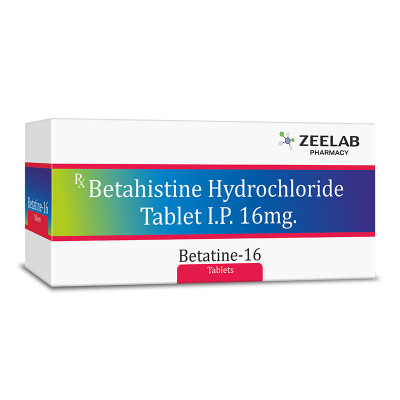
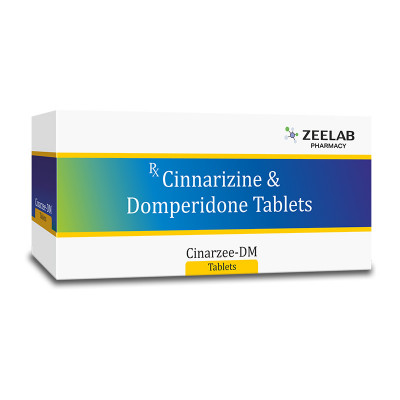
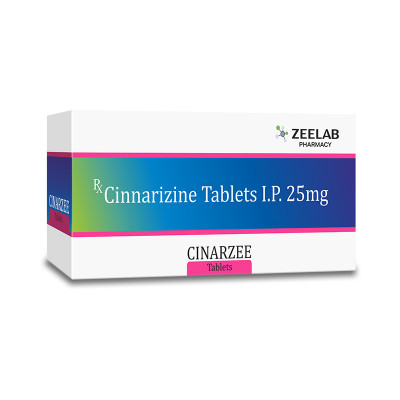
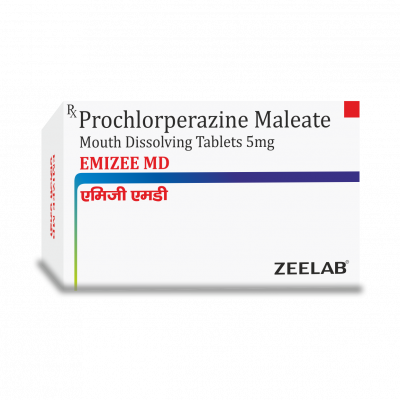
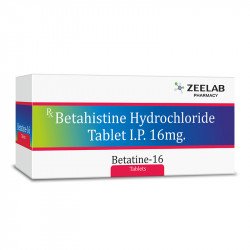
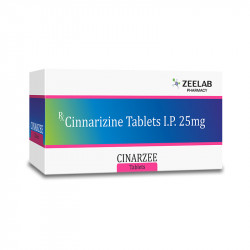
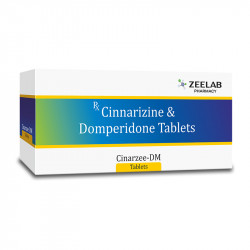
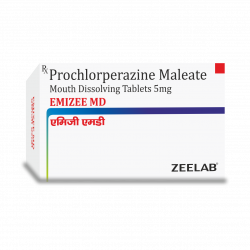








 Added!
Added!